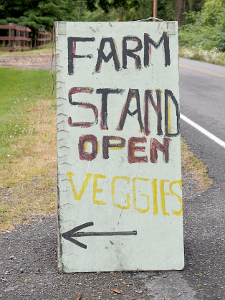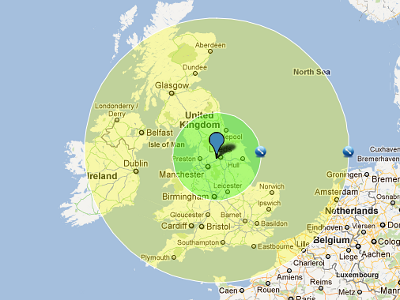What is ‘local’ for you?
 Yesterday on Not Dabbling In Normal, Xan wrote a post about ‘what is local?’. It’s actually something I’ve been meaning to write about for a while so I thought I’d ask you guys the same thing.
Yesterday on Not Dabbling In Normal, Xan wrote a post about ‘what is local?’. It’s actually something I’ve been meaning to write about for a while so I thought I’d ask you guys the same thing.
We know that it’s better to buy local food/resources and use local providers, because it means that our food, yarn or whatnot isn’t travelling halfway around the world to get to us and more money stays in our local economy rather than floating away to tax exiles overseas. But what is local to you?
Without thinking about it much, I guess I’d say local for me is things made, grown or raised in Yorkshire. It seems obvious: I live in Yorkshire and so stuff from Yorkshire is ‘local’ to me. But that’s a bit silly as there are lots of places in Lancashire, Derbyshire and Lincolnshire that are nearer to me that the top reaches of North Yorkshire. I don’t think I’m the only one with that idea though – when we go to a farmers market, it’s mostly sellers from Yorkshire too. Presumably producers in Lincolnshire and Derbyshire have big cities to supply closer to home.
Perhaps a radius is a better option – according to Xan:
Joel Salation of Polyface Farm has a useful, practical definition of “local”– you can drive there and back in a day. This gives you about a 4-hour radius, or just under 300 miles.
I’m not denying that doesn’t make perfect sense for Joel and many other people but a 300 mile radius from me covers all of the UK, and the top of the Netherlands, Belgium, France and a whole lot of sea (the yellow circle on the map below). I’d put something from that 300 miles over something flown in from New Zealand or Kenya but it doesn’t feel terribly local really.

I’ve heard other people say, and particularly in British context, ‘local’ is about a 100mile radius (the green circle on the map for me). That seems closer to my idea of local and seems practical too. But if I lived on the coast in Norfolk, or up in the highlands of Scotland, a 100miles radius would include too much sea/mountainous moorland to result in a lot of produce.
I think what I’m surmising is that local means different to different people, depending on where they are – what does it mean to you?
What do you consider ‘local’? Assuming you’re unable to buy everything locally, what do you prioritise to buy locally or from local suppliers? Do you think you could survive (and enjoy it!) on just local supplies?
(Radii produced on the “Free Map Tools” website in case anyone wants to try making their own.)
(Photo by e pants)





if it’s not yorkshire, it’s shite
Speaking as someone who lives near the coast in Norfolk, you are correct, it would involve too much sea. Also, if we were to consider driving to somewhere local within even a 100 mile radius, that’s a lot of petrol to consider. I personally would consider up to 10 miles in any one direction local, with the occasional extra 10 if needed to get to a large town or city. We have a ‘local’ farm shop near to us but I no longer shop there as I saw their waste bin one day and it had produce such as potatoes from Egypt and other things. Okay, banana’s and citrus fruit can be from elsewhere, but potatoes from Egypt! When shopping in the supermarket, I now buy as county local as possible and definitely British as much as possible. If I also shop in season, that’s better still.
I’ve been thinking about this as well, partly as a result of reading American blogs. It’s made me realise that the definition in the US doesn’t necessarily translate to the UK.
Buying US-grown oranges in the USA, for example,is great, but for many they’ll be transported further than the Spanish oranges I only buy occasionally because they’re from ‘so far away’. To be fair, most of the blogs I read would have a narrower definition of local than that, but even in-state gives a larger flexibility than in-county!
I suppose my definition of local is literally as close as possible. I buy from around my home town where possible.
Like you, I think of my home county of Oxfordshire as ideal, but actually I’m right up in the corner, and am only a few miles from Warwickshire, Northamptonshire, Buckinghamshire and Gloucestershire- all much closer than S Oxon.
The local Farmers Market has a criteria of 30 miles, and looking at that on the map link, that looks about right. 100 miles takes me up almost to Manchester, west past Cardiff and down to include the Isle of Wight. I wouldn’t think of any of those areas as local, but as from the UK. I suppose there has to be some benefit of living about as far from the sea as it’s possible to be!
300 miles reaches up to Edinburgh and down to south of Paris! Wonderful, but not local in UK terms.
local is my garden. I believe I can produce all the food I need for a substantial amount of the year for little other than setup costs. It helps being a vegan, I used to just be a vegetarian, but I recently decided to cut out dairy and eggs. I am not strict but in my family I have my own diet and occasionally will have a slice of cake ‘I’ didn’t make if you get my meaning.
The problem is that we pay too much for everything, because to balance out the prices, the prices of cheaper local produce is pushed up and we pay more for it to make the more exotic produce seem like better value and not such a luxury.
I don’t live in the UK any longer. We were spending almost two thirds of our salary on food, and we had a goodish salary for our region. The cost of food production is linked to the price of oil. Oil helps produce the food and deliver it to your ‘local’ shop and you use it to go and collect if from the shop. It even makes the plastic bags you use to ship it home.
And we wonder about the economy global warming and peak oil.
Local to me is within about an hour’s drive. That covers the National Trust farm where I buy 90% of my veggies and my butcher’s shop.
Having said that, I can’t escape the global economy completely – there are no dairies making cheese or supplying milk anywhere near here. Nor is there anywhere growing rice, lentils, etc. But I do try to shop carefully and avoid paying for, say, garlic grown in China when I could get some grown in Evesham, Worcestershire. (Garlic is one thing my farm shop doesn’t sell.) Also, I’d rather pay a little more for mozarella made in Italy or real Greek feta, than buy the cheap imitations made in Denmark.
Hmm, I don’t think a 4-hour radius equate to 300 miles in the UK – fancy driving to Penzance and back in a day?
When I started thinking about your question, I found I have quite a lot of levels of ‘local’.
1. Garden/village. This includes honey from Linfa next door (even though her bees live at a lower altitude) and meat from Peter and Joanne’s farm that we can just about see from the house (even though driving there means going quite a long way round).
2. A bit further away, meaning eggs from the farm over the mountains (via the local shop) and any meat bought from the butcher in town, which specialises in local sources, though I don’t actually know where, exactly.
3. Wales (which turns out to be a 65 mile radius). This mainly applies to milk and butter.
4. UK. I’m not sure what this is relevant to, apart from sugar.
5. Europe, which mainly applies to citrus fruit.
It’s all relative!
Hi guys,
Thanks for the comments – lots to mull over.
strowger: strong words from a man who pretty much lives in Lancashire :P
datacreate: yes, I was thinking of you when I referenced Norfolk :) Our radius would be a lot smaller if we had to drive out to all the other places individually – for time as much as petrol reasons – thank heavens for farmers markets and shops which stock local produce :) Potatoes from Egypt is rather silly, yes!
Hazel: what sort of things are grown/raised around your home town? We can easily source meat & dairy from the Leeds/Bradford area but veg and cereals are a lot thinner on the ground. I think the Leeds Farmer’s Market is officially 30 miles too but I’ve seen stuff from the coast and t’other side of Lancashire too.
Carl Craven: lucky you, being able to grow so much at home :) I agree that we don’t often think of the true value of things – the subsidies, the pollution, the social impact. Many things would cost a lot more if we did!
PipneyJane: We go through a lot of rice and spices that would be hard/almost impossible to grow in the UK without a lot of resources expenditure. From a food miles perspective, I’m sort-of ok with importing that stuff because it doesn’t need to be flown in – but I do know I need to look into it more to take into account the other issues (environmental impact, social impact, human welfare issues) and should definitely try to source things that can be grown in the UK from the UK.
Artisan cheese & meats are one of my naughty areas – parmesan and various cured sausages from different parts of Europe. I really need to get back onto the sausage-making bandwagon myself!
Rachel: Now I’ve been thinking about it, we have different circles like you. We’ve got no excuse not to get some things locally – like eggs from our garden or meat from a nearby farm – but some things do/have to come from further afield. I do think we’ve got a couple of things on the latter list that could be shifted onto the former one with a bit of a mindset chance and I think I’ll make that a goal for 2012 :)
Louisa, I think our farmers market stretches the 30 mile limit too- certainly we couldn’t have Selsey fish there otherwise! It beats the fish counter at Tescos though, and like the imported rice and lentils I can’t get it from any closer.
From within 8 miles I can get lamb, pork and beef (I can see the farm from our landing window!), honey and eggs if our chickens aren’t laying from the small holding over the road, game, potatoes, organic and non organic veg of all types including asparagus, ice cream! and yogurt (and raw milk if I arrange it), commercially grown soft fruits are 15 miles and PYO apples, pears, plums etc are 20 miles away. I can get tail corn for the chickens from a farm 5 miles away, and flour from Oxfordshire wheat in bulk from a mill 30 miles away.
Butter and cream is available from about 10 miles away, but it’s so expensive I must confess to buying mostly from the supermarket. My milk comes from farms within a (?) 50 mile radius, via Tewkesbury. It’s delivered in glass bottles, so I’m happy with that!+
Not a bad list when I write it all down. It does make me realise how lucky I am. I am trying to use potatoes more than rice or pasta. They’re local, cheap, more nutritious than white rice or pasta and are packaging free. Sometimes it just has to be Pasta Pesto though! Or at least it does if you’re one of my children. And making my own pesto from my own basil is on next years to do list…